BAHR Energy Insight
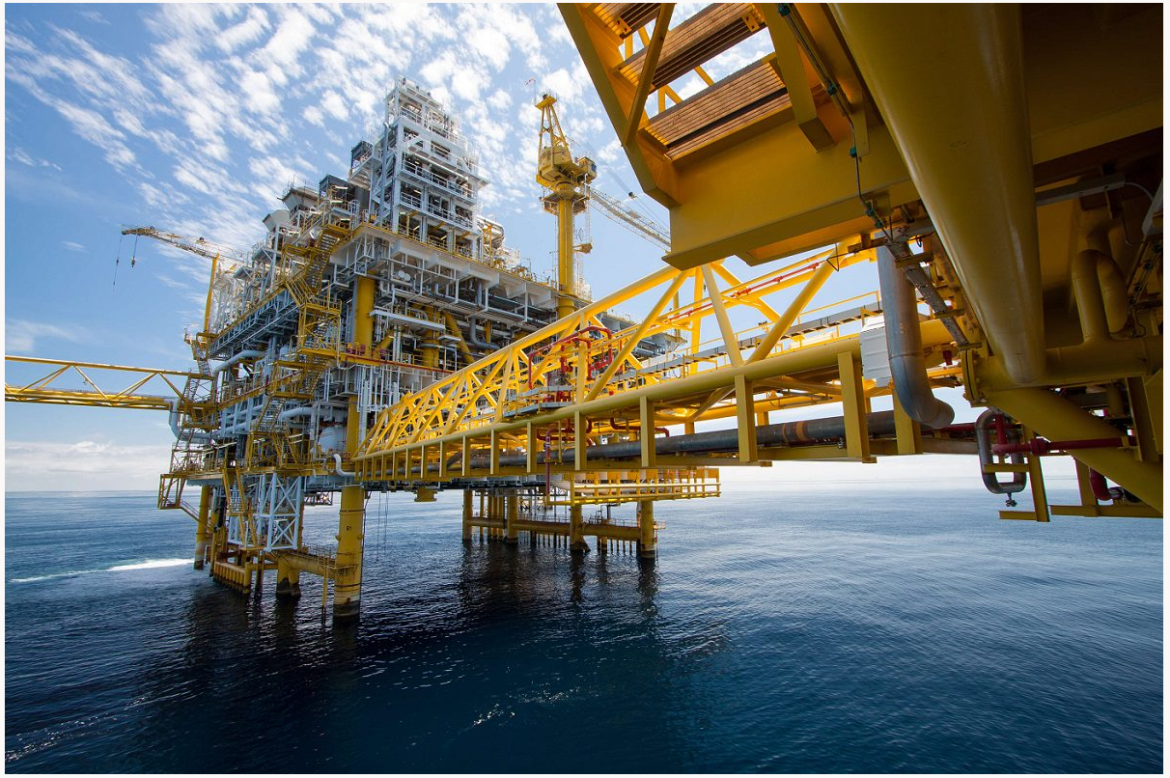
Introduction
On 13 September 2021, Norwegians once again turns to the ballot boxes to vote in the parliamentary elections. One of the key topics in the upcoming election campaign could be the future terms of the petroleum industry operating on the Norwegian continental shelf (the “NCS”). Must the petroleum industry make way for more sustainable sources of energy and be discontinued? Or will the climate challenges related to the petroleum industry be met by using the carrot, not the stick?
The petroleum industry is the largest and most important sector of Norway’s economy measured in terms of value added, government revenues, investments and export value. Before the parliamentary election in 2017, BAHR issued a newsletter analysing the election and its potential impact on the petroleum industry. Prior and since then we have monitored and observed the industry closely as a spectator, but also as an advisor to several of the industry leaders. On this basis we now return with a newsletter where we assess the upcoming election and the impact the result could have for the petroleum industry. To focus the assessment, we primarily concentrate on the following topics which all are part of the public debate:
- The question of continuation or discontinuation of petroleum activities, including policies of not awarding new production licences as a mean to limit the petroleum industry
- Electrification of the offshore petroleum activities
- Petroleum activity in the Northern areas of Norway
- Parliament’s involvement in investment decisions
- The petroleum tax regime
Our assessment is made primarily on the basis of the parties’ policies as they are presented in each of the parties’ election manifestos. The assessment also includes statements given to the media and in debates. Our ambition is to give a rough guide to the parties’ perspective on the Norwegian petroleum industry in relation to the selected key topics and the potential impact these perspectives could have on the industry after the election in September.
Overview of the political landscape going into the election
The blocks
Based on the most recent polls it looks as if there will be to two competing coalitions, with the other parties seeking to influence policies from outside the administration. For the sake of simplicity, we refer to the two potential coalitions as the “Conservative block” and the “Labour block”.
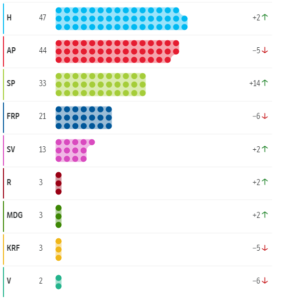
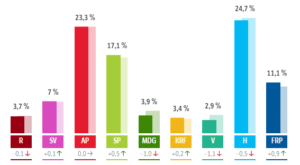
Should the final outcome of the election be as the most recent polls suggest, the Labour Block will be the largest block and will on that basis have grounds to start negotiations to form a new administration. The election is however still months away, and much can still change. The below tables illustrate the standings as of late April 2021, according to a poll held by the Norwegian public broadcaster NRK.
The conservative block
The Conservative block currently holds office and consists of the Conservative Party (Norw: Høyre), the Christian Democratic Party (Norw: Kristelig Folkeparti) and the Liberal Party (Norw: Venstre). Although the Conservative Party based on recent polls is the largest party, it’s partners the Christian Democratic Party and the Liberal Party are struggling to get above the electoral threshold of 4%.[1]
The Conservative Party is in favour of continuing and developing the Norwegian petroleum industry. The Conservative block’s position on the petroleum industry is however fractioned. Although not explicitly stated in the Liberal Party’s program, the party’s politics on the petroleum industry is effectively one of discontinuation of petroleum activities in Norway. Despite holding this policy over some time, it is not a part of the administrations shared platform of policies (Norw: Regjeringsplatform) to which the Liberal Party has signed up.
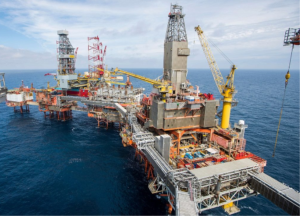
The Christian Democratic Party’s stance lays somewhere in-between. Although also the Christian Democratic Party is looking to phase-out the Norwegian petroleum industry, the Party’s policy appears more emphasised towards shielding the areas in the Northern parts of Norway from petroleum activities.
The Labour Block
The Labour blocks consists of the Labour Party (Norw: Arbeiderpartiet), the Centre Party (Norw: Senterpartiet) and the Socialist Left Party (Norw: Sosialistisk Venstreparti). Although the Labour party is the largest of these parties, the coalition’s strong position going in to the election is much owed to the significantly increased support to the Centre Party which is now the third largest party in Norway with a current support of approximately 17% in recent polls. The Socialist Left Party has a support of approximately 7% in recent polls, which is similar to their result in the 2017-election.
Similar to the Conservative block, the Labour block’s overall perspective on the petroleum industry is also conflicting. Going into the election campaign as the second and third largest parties, both the Labour Party and the Centre Party respectively have adopted policies in favour of continuing the extraction of petroleum resources and also continue to award new licences. The Socialist Democratic Party is however an outspoken critic of the petroleum industry and argues in favour of discontinuing the industry.
Parties outside the blocks
The political landscape also consists of the Progress Party (Norw: Fremskrittspartiet), the Green Party (Norw: Miljøpartiet De Grønne) and the Red Party (Norw: Rødt).
The Progress Party strongly supports the petroleum industry and argues to increase petroleum-activity on the NCS, also in the Northern areas. This is opposed both by the Red Party and the Green Party. The Red Party is arguing in favour of not allowing any new licences to be awarded and through this reduce petroleum activity on the NCS by 90% within 2030. The Green Party wants to discontinue the petroleum industry on the NCS within 2025.
Out of the three, the Progress Party is the largest party with an estimated support of approximately 11% in recent polls. The ambition for the Green Party and the Red Party is probably to gather enough support to reach over the 4% electoral threshold.
Focus areas in this analysis
The continuation of the petroleum industry
The Paris Agreement Article 4 (2) decides that the Parties to the Agreement “shall prepare, communicate and maintain successive nationally determined contributions that it intends to achieve”. This policy is implemented in Norwegian legislation trough the Climate Act which decides (Article 3) that emission of greenhouse gasses should be reduced by 40% within 2030, compared to the emissions in 1990. Further, Article 4 of the Climate Act targets that Norway should be low-carbon nation within 2050.
Against this backdrop, a difficult question arises: Is having a petroleum industry compatible with achiving the targets set out in the Paris Agreement and the Climate Act, or must the petroleum industry as such be discontinued?
An important observation going into the election campaign is that the Conservative Party, the Labour Party, the Centre Party and the Progress party all are in favour of continuing the petroleum industry on the NCS. These are the four largest political parties according to the most recent polls with a combined support of approximately 75%, and were also the four largest parties at the 2017-election.
A cornerstone in the Conservative Party’s position on the petroleum industry is the recognition of the petroleum industry as “Norway’s largest and most important industry”.[2] The Conservative Party’s election manifesto explicitly goes against setting an “end date” on the petroleum industry, but rather underlines the significance of supporting the industry in its search for new resources and also towards a more environmentally friendly production.
Although the Conservative Party’s stance is much aligned with the Labour Party’s stance, one can easily identify questions revolving around the petroleum industry as particularly challenging to the Labour Party. You could say that the Labour Party, to a larger extent than for instance the Conservative Party, needs to balance two different considerations which pulls in conflicting directions. Many of the employees in the sector performs manual labour jobs and are as such at the core of the Labour Party’s voter base which, in turn, is linked with the support of the Workers Union (Norw: LO). The Labour party is therefore wary of adopting policies that could be perceived to distrust or undermine their role in the building of the Norwegian welfare state. The Labour Party’s overall target is to develop the industry, not dismantle it.[3]
 There are however strong forces against the petroleum industry in the Youth Labour Party, who in their manifesto argues in favour of not awarding new licences on the NCS and therefore phasing out the petroleum industry within 2035.[4] Although this policy is not shared by the Labour Party, the Youth Labour Party has a track-record of putting pressure on its parent party and push the Labour party further towards the left, for instance regarding the issue of petroleum activities in northern Norway.
There are however strong forces against the petroleum industry in the Youth Labour Party, who in their manifesto argues in favour of not awarding new licences on the NCS and therefore phasing out the petroleum industry within 2035.[4] Although this policy is not shared by the Labour Party, the Youth Labour Party has a track-record of putting pressure on its parent party and push the Labour party further towards the left, for instance regarding the issue of petroleum activities in northern Norway.
Looking at the other parties, the policy of continuing the Norwegian petroleum industry is not only shared by the Conservative Party and the Labour Party. The Centre Party, with its strong emphasis on protecting the Norwegian work force, represents a robust voice in favour of the petroleum industry on the NCS. Further, the Progress Party is a firm and outspoken supporter of the petroleum industry and argues to increase petroleum-activity on the NCS.
Policies of not awarding new licences as a mean to discontinue the petroleum industry
Pursuant to the Norwegian Petroleum Act, the Norwegian State has the proprietary right to subsea petroleum deposits and the exclusive right to resource management. A production licence from the State is required to be able to conduct petroleum activities. For the petroleum industry to continue, the licensees are dependent on new acreage to be opened for petroleum activities and licensing rounds to be held awarding the licensees the right to search for petroleum. As a way of discontinuing or effectively halting the petroleum industry, several parties are in favour of not awarding any new licences.
The strongest advocate for this policy is notably the Green Party. The Green Party argues for not allowing further licences to be awarded on the NCS and to stop the opening and expansion of fields that are already awarded. Through this policy, the Green Party seeks to phase out petroleum activities on the NCS. This policy is shared by the Socialist Democratic Party, the Liberal Party and the Red Party who holds that the already awarded licences ensure sufficient production for several decades and that no more licences to extract petroleum on the NCS should be awarded. The Christian Democratic Party’s stance is more cautious and the election manifesto supports further licences, provided that no petroleum activity takes places in fragile areas.
As demonstrated above, the policy of phasing-out the Norwegian petroleum industry is not supported by the four largest political parties. The above review however illustrates that there are advocates for this policy within both the Conservative Block and the Labour Block. One can therefore perceive that the question will to be subject to negotiations for any of the blocks looking to form an administration following the election. This has become even more relevant following the recently published report from the International Energy Agency (IEA), suggesting that no new areas should be opened for petroleum activities if the targets in the Paris agreement are to be met.[5]
Electrification of facilities on the NCS
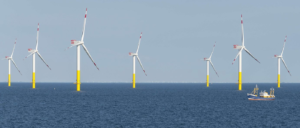
As mentioned above in the section on the continuation of the petroleum industry, Norway is committed by the terms agreed in the Paris Agreement as implemented in the Climate Act. In order to facilitate for a more environmentally friendly operation, the parties have generally adopted policies that include the aim of electrification of petroleum activities on the NCS. In fact, the only party to oppose the electrification is the Progress Party, who also argues to stop electrification-projects that are awarded, but not yet initiated.
Therefore, based on the wide political consensus, it is likely that any administration taking office after the election in September 2021 will work to ensure this goal. As the NCS grows more mature and the projects are often smaller, it will be important for the industry to seek to ensure competitive terms for such electrification. Powering the NCS by electricity is one of the key steps in reaching the targets of the Paris Agreement.
Petroleum activity in the Northern areas of Norway
One of the other key areas of the general debate regarding the petroleum industry is the question of petroleum activities in the certain parts of northern Norway; notably around the areas of Lofoten, Vesterålen and Senja.[6] In our above-mentioned newsletter prior to the parliamentary election in 2017, we assessed the parties’ stance on doing an impact study on these areas for the purpose of searching for petroleum resources. Our assessment then concluded that only the Progress Party and the Conservative Party where in favour, whilst the Labour Party only supported doing an impact study for the Nordland VI area.
Four years later, the development of petroleum activities in the same norther areas remains a politically challenging question. The only shift in policy is however that the Labour party now also opposes performing and impact study for the Nordland VI. Therefore, the only parties now in favour of potentially developing these areas are the Progress Party and the Conservative Party.
Parliament’s involvement in investment decisions
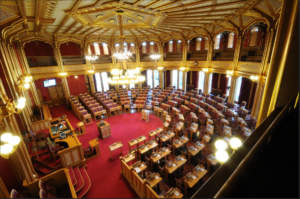
The Norwegian parliament’s policy is that projects on the NCS valued at below NOK 20 billion can be decided on solely by the Ministry of Petroleum and Energy. Projects values above NOK 20 billion must also be presented and approved by the Norwegian Parliament, which is a more extensive procedure than for other decisions made by the administration.
From the year 2014 to 2020, a total of 20 projects with a combined value of NOK 146,7 billion were approved by the Ministry of Petroleum and Energy on the basis of this policy. The policy is however on the political agenda going into the election.[7]
The policy is most notably criticised by the Socialist Democratic Party. They will seek to lower the threshold of parliament’s involvement to NOK 5 billion. The initiative is supported by the Centre Party, and The Liberal Party has also voiced its support to adjust the threshold for involvement. The Labour Party has previously opposed this, but now suggests that lowering the threshold could be assessed if the Labour block takes office following the election.
The suggestion from the above-mentioned parties to lower the threshold has however been opposed inter alia by the Conservative Party who holds that the current threshold of involvement provides parliament with adequate influence on the decision making.
The petroleum tax system
Going into the election, several of the political parties are advocating for assessments or changes to the petroleum tax system.
The Liberal Party, for instance, is arguing for several alterations to the system in order for the petroleum companies to bear a higher risk on its investments in the petroleum industry. Further, both the Green Party and the Socialist Democratic party argue in favour of a shift towards a greener tax system which further supports and incentivises environmentally friendly industries. It could be mentioned that the Green Party has filed a complaint to the EFTA Surveillance Authority claiming that the temporary changes in the petroleum tax system, implemented in 2020 to maintain the investment activity in the petroleum sector, are in conflict with the EEA state aid legislation.
The Christian Democratic party intends to review the petroleum tax system, but has not proposed any specific alterations. The Red Party also propose for the petroleum tax system to be abolished.
In their election manifesto, the Conservative Party holds that it will consider tax related measures and other arrangements in order to increase the competition and thus to increase the utilization rate. Additionally, the Labour Party argue for “tougher terms” in order to allocate a larger proportion of the profits in areas subject to petroleum related activity.
Observations and concluding remarks
As observed above, both the Conservative Party, the Labour Party, the Centre Party and the Progress Party have adopted policies that emphasises the key role of the petroleum industry for the Norwegian economy and they all support the continuation of petroleum activity on the NCS. None of the parties that oppose further petroleum-activity is likely to generate support sufficient to dictate such fundamental changes to the industry, should the most recent polls prove accurate.
There could nevertheless be shift to towards the Parliament being closer involved in the decision making for projects on the NCS. The current threshold of NOK 20 billion is adopted annually as a power of attorney from the Parliament to the administration and changing the threshold would therefore not require lengthy procedures. As noted above, several parties argue in favour adjusting the threshold.
Further, there is wide political consensus in favour of powering the NCS by electricity. One can therefore expect any administration taking office following the election to develop terms and policies that continue to ensure this ambition is met. Additionally, we expect the terms of the petroleum tax system to remain a politically important topic.
BAHR will continue to observe the developments and issue subsequent newsletters on the election.
